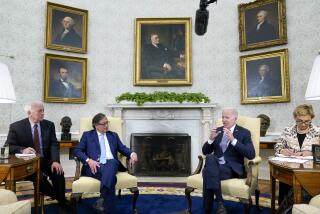Powell, New Congolese Leader Discuss African Nation’s Peace Prospects
- Share via
WASHINGTON — Secretary of State Colin L. Powell, who has pledged to make Africa a higher U.S. priority, met Thursday with Congo’s new president to explore the prospect of ending that country’s complex, many-sided war.
Powell discussed the deteriorating situation in Congo with President Joseph Kabila, who last month succeeded his assassinated father, onetime guerrilla chieftain Laurent Kabila. The session followed a similar discussion Wednesday between Powell and Rwandan President Paul Kagame. The African leaders were in Washington to attend the annual National Prayer Breakfast on Thursday.
During his half-hour meeting with Kabila, Powell told the new president that the United States, along with the United Nations, will provide resources and diplomatic assistance, to help his government “get on with the task of peace and democratic development in the Congo,” according to a senior State Department official who requested anonymity.
But Powell also stressed that it is time for Congo to join other African nations that have successfully opened both their economies and their political systems, the official said. Kabila told Powell that he recognized that achieving peace will require resolving internal political divisions as well as regional tensions.
“It was a positive meeting with a clear direction of peace and reconciliation and an understanding that the main task is to get on with peace and democratization,” the official said.
Powell urged Kabila to halt the fighting in his country, which involves at least six African nations, and honor the terms of a 1999 peace accord signed by his father. The government in Kinshasa is widely viewed as the main obstacle to the pact’s implementation.
As many as 1.7 million people have been killed in the conflict since the peace agreement was signed, according to a relief group whose estimate the State Department cited Thursday.
Powell told reporters that he wants to explore ideas that Kabila discussed in his inaugural address last week, including the deployment of U.N. forces and free elections. Powell described Kabila’s address as “interesting and impressive.”
But the prospects of any kind of imminent breakthrough aren’t good.
In an ominous sign, Kabila said Thursday that certain clauses of the so-called Lusaka accords should be “reexamined,” and some renegotiated.
“I believe it’s something that has to be renegotiated. It was signed in July 1999. After today, almost two years, I mean it’s just obvious that there are clauses that have to be reviewed,” he said in an interview with PBS’ “The NewsHour With Jim Lehrer.”
U.S. officials acknowledged privately that it’s unclear whether Kabila, who is believed to be between 29 and 31 years old and has no experience in politics, will be able to retain leadership in a country with deep political and ethnic divisions--or prevent its further fragmentation.
Kabila faces serious competition for leadership from within his father’s inner circle of advisors and generals.
In his meeting Wednesday with Rwandan President Kagame, Powell explored possible ways to jump-start the peace process, including reconciliation in Congo, withdrawal of foreign forces and demobilization of militias, according to State Department spokesman Richard Boucher.
Kagame promised Powell that Rwanda would withdraw its forces from Congo as soon as its own security was guaranteed.
Kabila and Kagame are among the first heads of state to visit Washington since President Bush was inaugurated.
In another reflection of growing U.S. interest in the Central African crisis, the State Department expressed “grave concern” about the deteriorating situation and pledged a $10-million emergency package of humanitarian aid to help 2 million displaced people inside Congo and 327,000 refugees who have spilled into neighboring countries.
The Congo crisis and the plight of millions of people in Central Africa are “very much on our minds,” Boucher said.
Washington blames the Congolese government for hampering relief efforts. “Government restrictions on relief activities have continued to hamper humanitarian operations,” Boucher said.
Troops from Zimbabwe, Angola and Namibia have intervened in Congo to prop up the government in Kinshasa, while Rwanda and Uganda back rebel forces trying to bring down the government.
Powell has made it clear that he wants to increase U.S. diplomatic contacts with Africa.
In his Senate confirmation testimony, Powell said he’d like to spend more time thinking and talking about a region that, in his view, hasn’t received sufficient attention from the United States.
He said America has “an obligation to the people of Africa,” who are desperate for assistance. “We need to help them,” he said. As he prepared for his new job, the secretary of State asked that his first official briefing be on Africa, a move that was well noted throughout the State Department.
Powell’s remarks contrast with Bush’s observation last year, during an interview on “NewsHour,” that Africa didn’t “fit into the national strategic interests.”
More to Read
Sign up for Essential California
The most important California stories and recommendations in your inbox every morning.
You may occasionally receive promotional content from the Los Angeles Times.













